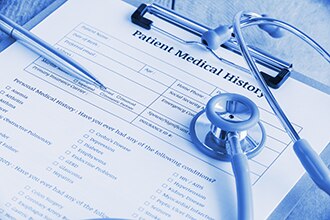Diagnosis of Cirrhosis
How do doctors diagnose cirrhosis?
If your doctor suspects that you have cirrhosis, they may make a diagnosis based on your medical history, a physical exam, and the results of blood tests and imaging tests.
Family and medical history
 Your doctor will ask if you have a history of alcohol use or health conditions
that increase the risk of developing cirrhosis.
Your doctor will ask if you have a history of alcohol use or health conditions
that increase the risk of developing cirrhosis.Your doctor may ask about your symptoms and whether you have a history of health conditions that increase the risk of developing cirrhosis.
When taking your medical history, your doctor may ask about
- any recent changes in weight or appetite
- alcohol use
- prescription and over-the-counter medicines or herbal supplements you take
Your doctor may also ask if you have a family history of health conditions, including liver conditions.
Physical exam
In a physical exam, your doctor will
- look for jaundice, or a yellowish tint to the whites of your eyes and skin
- check your skin for rashes and legs for swelling
- use a stethoscope to listen to your heart, lungs, and abdomen—or belly
- tap or press on different areas of your abdomen to check for swelling or tenderness
- check to see if your liver has become larger
- check your outstretched hands for tremor
What tests do doctors use to diagnose cirrhosis?
Blood tests
 Your doctor can use blood tests to tell how serious cirrhosis is.
Your doctor can use blood tests to tell how serious cirrhosis is.Your doctor may recommend the following blood tests
- liver tests that can show if liver enzyme levels are higher or lower than normal, which may be a sign of liver damage. Your doctor may suspect cirrhosis if you have
- complete blood count, which can show signs of infection and anemia that may be caused by internal bleeding.
- tests for viral infections to see if you have hepatitis B or hepatitis C.
- tests for autoimmune liver conditions, which include the anti-nuclear antibody (ANA), anti-smooth muscle antibody (SMA), and anti-mitochondrial antibody (AMA) tests.
Based on the blood test results, your doctor may be able to diagnose certain causes of cirrhosis.
Your doctor can use blood tests to tell how serious cirrhosis is.
Imaging tests
Imaging tests can show the size, shape, and texture of the liver and show how much fat is in the liver. Some tests can also measure the stiffness of the liver. Cirrhosis increases liver stiffness. Your doctor may use one or more of the following imaging tests
- ultrasound uses a hand-held device, called a transducer, that bounces safe, painless sound waves off organs to create an image of their structure.
- magnetic resonance imaging (MRI) uses radio waves and magnets to produce detailed images of organs and soft tissues without using x-rays.
- x-ray tests, such as computed tomography (CT) scans, use a combination of x-rays and computer technology to create images of the liver.
- elastography, a special test that measures the stiffness of the liver. An increase in liver stiffness may be a sign of fibrosis, or scarring. Your doctor can use stiffness measures to see if you may have cirrhosis and whether liver scarring is getting better or worse.
Liver biopsy
Your doctor may perform a liver biopsy to see how much scarring is in your liver. A liver biopsy can diagnose cirrhosis when the results of other tests are uncertain. The biopsy may also help your doctor identify the cause of cirrhosis and determine whether you need treatment.
During a liver biopsy, a doctor will use a needle to take small pieces of tissue from the liver. A pathologist will examine the tissue under a microscope.
This content is provided as a service of the National Institute of Diabetes and Digestive and Kidney Diseases
(NIDDK), part of the National Institutes of Health. NIDDK translates and disseminates research findings to increase knowledge and understanding about health and disease among patients, health professionals, and the public. Content produced by NIDDK is carefully reviewed by NIDDK scientists and other experts.

